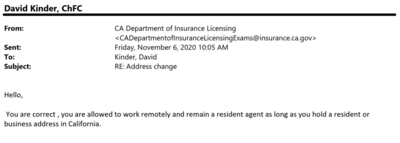- 11,537
4) I see that you can register as an individual or as a business. I have a business partner, so could we just register as a business instead of as individuals so that we can save half the fees? Or would we need to instead both register as individuals in each state?
You're missing a fundamental understanding that I hope you get as you go through pre-licensing:
Licensing is about being held accountable by a government regulatory authority for your actions and recommendations.
Now, apply that understanding to what you're asking:
- An individual must be held accountable by a government regulatory authority, so the individual must be licensed.
- You cannot 'split' a license any more than you cannot split the ability to be held accountable.
- A business entity will need to also be held accountable. Who runs the licensed business entity? At least one licensed individual.
So, you and your business partner must both get your individual resident licenses in your state. You get your business registration done and name approved by your state DOI and get your business licensed as well. That's just in one state. Rinse and repeat for each state you want to do business in. (Although I don't think you need to get your business name approved in each non-resident state as long as it was approved in your resident state.)
Do you need to do all that? Depends on your goals.

